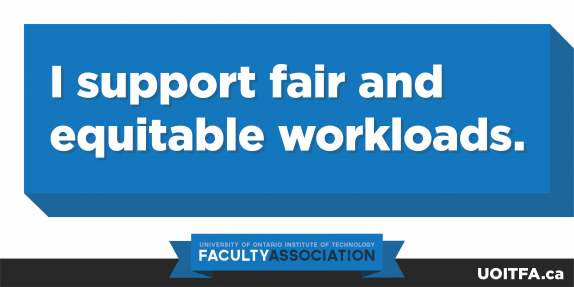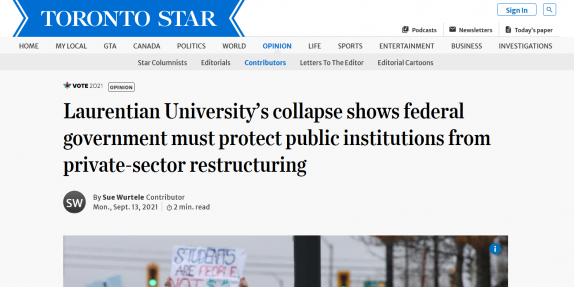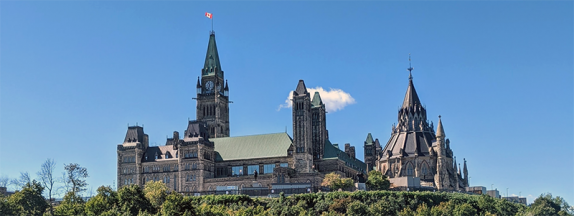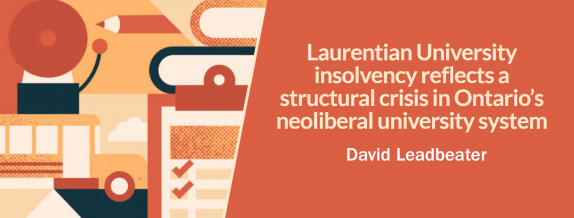Ontario faculty associations are sending letters to federal candidates running in their regions and asking those seeking a seat in Parliament to exempt public institutions from private-sector restructuring under the federal Companies’ Creditors Arrangement Act (CCAA) and the Bankruptcy and Insolvency Act (BIA). It was under the CCAA that, earlier this year, Laurentian University acted to cut more than 60 programs and hundreds of jobs, throwing away decades of important research and longstanding commitments to Francophone and Indigenous programming.
“If other public institutions are allowed to invoke the CCAA or BIA, the results will be devastating,” said OCUFA President Sue Wurtele. “This federal election is an opportunity to pressure candidates from all parties to commit to updating the CCAA and BIA to exempt public institutions and protect Canada’s vital public services.”
The letters are part of a broader OCUFA campaign to raise awareness about the dangers the CCAA and BIA pose to public institutions across Canada, including universities.
In a major success, as a result of public pressure, both the federal Liberal and New Democratic Parties have included commitments in their platforms to reforming and exempting universities from the CCAA.
“This is a warning to anyone who values Canada’s public institutions,” said Wurtele in a recent Op-Ed for the Toronto Star. “If changes are not made to federal insolvency and bankruptcy legislation, this story of destruction will repeat itself elsewhere.”
OCUFA is committed to pressuring the next Parliament to make sure that, no matter who is elected, changes are made to the CCAA and BIA.
The text of the letter follows:
Dear [LOCAL CANDIDATE NAME],
I am calling on you as the 2021 federal election candidate for the [POLITICAL PARTY NAME] in the riding of [RIDING NAME] to commit to amending the federal Bankruptcy and Insolvency Act (BIA) and the Companies’ Creditors Arrangement Act (CCAA) to exempt public institutions that receive transfer payments and government operating grants and to commit to adequately funding public institutions across Canada.
Public and publicly assisted institutions differ from private sector corporations in various ways, including their requirements for compliance with policy and operating procedures related to governance, accountability, finance, and administration. Public institutions should not be subject to the same rules and regulations governing financial insolvency and bankruptcy for corporations in the private sector.
Last February, Laurentian University, a public institution in Ontario, filed for insolvency protections under the CCAA—a federally legislated process designed for corporations, not publicly funded institutions. Laurentian is the first public university in the country to file for bankruptcy protection. This resulted in the devastating loss of hundreds of jobs and academic programs at a publicly funded, bilingual, and tricultural institution with a mandate to serve the broader northern community in Ontario. These proceedings also have alarming implications for the postsecondary sector and public institutions across the country.
This federal election is an opportunity to commit to our cherished public institutions that have been created for the common good, including universities, and to ensure that they are protected from proceedings designed for private sector corporations under the BIA and CCAA acts.
It is the responsibility of federal and provincial governments to ensure the health and sustainability of public institutions through appropriate instruments and regulations for the public sector.
I urge you and the [POLITICAL PARTY NAME] to commit to adequately funding public institutions across the country, including universities, and to amending the BIA and CCAA acts to exempt public institutions.
I await your response to my letter.
Sincerely,
- Algoma University Faculty Association
- Brescia Faculty Association
- Brock University Faculty Association
- Carleton University Academic Staff Association
- University of Guelph Faculty Association
- Huron University College Faculty Association
- King’s University College Faculty Association
- Lakehead University Faculty Association
- Laurentian University Faculty Association
- McMaster University Faculty Association
- Nipissing University Faculty Association
- Northern Ontario School of Medicine Faculty and Staff Association
- Ontario College of Art and Design Faculty Association
- Association of Professors of the University of Ottawa
- Queen’s University Faculty Association
- Renison Association of Academic Staff
- Ryerson Faculty Association
- Professors’ Association of Saint Paul University
- Jerome’s University Academic Staff Association
- University of Toronto Faculty Association
- Trent University Faculty Association
- Faculty Association of the University of Waterloo
- University of Western Ontario Faculty Association
- Windsor University Faculty Association
- Wilfrid Laurier University Faculty Association
The list of signatories will be updated as more letters are sent.













